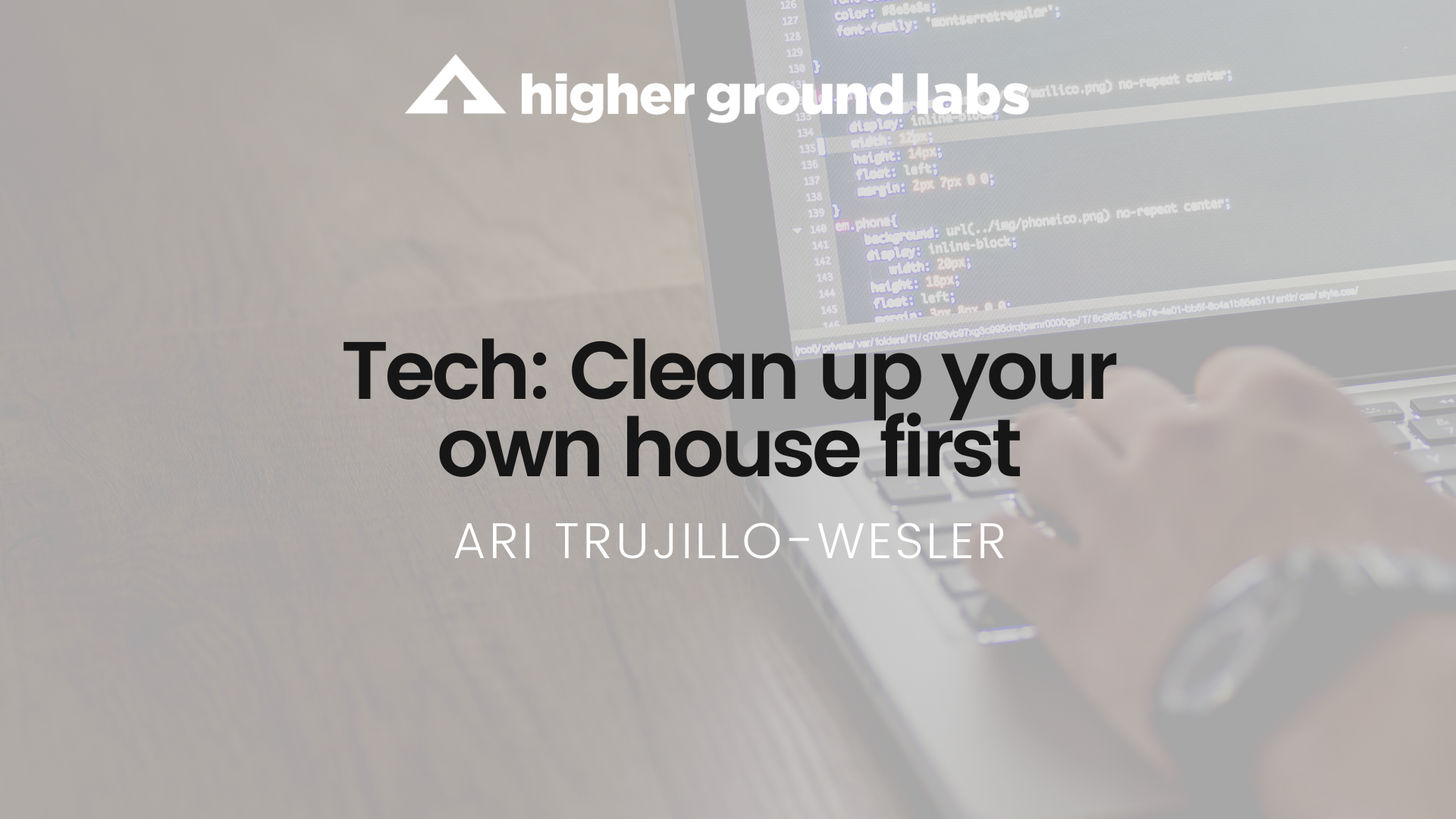We sat down to have a conversation with one of our founders, Ari Trujillo-Wesler, co-founder of OpenField, technologist, and activist, on her thoughts of the tech space and this moment.
On-the-ground activists: “the less data you collect, the better”:
A lot of technologists and organizers who do not have a deep experience with surveillance in the police state are asking, ‘how can we help,’ or ‘let’s visualize this data-set this way,’ or ‘is there a way we can help people organize these things online?’ But that’s not helpful.
The reality is that most of the systems that we have, most tech that exists, including my own, is really built around aggregating as much data as you can to learn about who these folks are/how they operate so you can give that data to institutions and they can learn from it. Any time you are doing anything that involves challenging the state’s power, challenging the police, challenging the domestic industrial military complex, the less data you have the better off you are.
For example, when organizers say there is an Eventbrite, it’s an immediate flag to organizers on the ground because you shouldn’t be collecting the names of the people that are coming. Any list that you acquired can be taken, subpoenaed, and now everybody on that list is in danger because retaliation against activists and protestors, even people who are not defined as leaders, is a tactic in order to quell the ensuing uprising.
We need protection from technology:
It’s not important for us to know people’s names. It’s actually important for us to not know people’s names. It’s really important for us to not have lists or data, which is the bread and butter for most technologists. We don’t want to share these things, or share resources that will make it easier for the police to identify people at large – it’s actually our responsibility to make sure that doesn’t happen.
We need to be mindful as technologists on how we are enabling or supporting the police-state with the way we interact in this space, and how much privilege or entitlement is in thinking that there might be a hack for systemic racism in America. The reality is that there isn’t. The thing that tech is really supposed to do is serve people, and the people really don’t need more technology. Actually they need protection from technology. In that regard, most of the solutions are lower tech because there’s lower exposure.
You can’t ‘disrupt’ racism:
The role white supremacy plays in tech has been in ways both big and small. Technology spaces are incredibly white, and people with power in tech spaces are white or extraordinarily privileged. So the expectations and experiences of these systems is that most of the people who have gotten to this place is because the system was built for them.
Rarely, if ever, when people talk about “liking to disrupt systems,” it’s because they like to disrupt systems that they find inconvenient. You can’t disrupt racism. There’s not a technology hack – there’s not an app for undoing systemic racism. That’s now how that works. It’s certainly not a simple switch that is built in your ability to write lines of code. It involves tons of hearts and minds and intense self-reflection, experience and story, all of which are usually dismissed.
There’s something really important about inviting technologists to reflect on the way in which we historically approach problems, historically arrive in these spaces, and to recognize this is actually a space where you may feel powerless when you normally chase and want to feel powerful.
If you are invited, you should come:
This becomes the new thing that people wanna do, like, “well I have this idea,” or “I think it would be really cool if we did this.” That is not useful right now. If you believe that this whole thing isn’t organized – I will say it is incredibly organized. This whole movement has gone back generations, directly back to the civil rights movement, directly back to the original abolitionist movement when the slaves freed themselves.
The people who are leading this have been showing up for a very long time. Technologists are often saying, “they need this” or “they need that,” but the movement has their own full stack developers, designers, etc. making decisions and building. There is not a need for outside professionalized help, and if they do need so, they have the relationships to tap into networks.
So the answer is, if you are invited, you should come. If you are not, you should be helpful in the ways that are helpful – around big money, marching, talking to, and organizing the people in your life about anti-Blackness – and if the inclination is still there, doing some of your inner own excavation on why you feel the need to lead or dictate leadership.
Racism is not a tech problem, it is a cultural problem:
There is a lot that technologists can do around questioning and dismantling white supremacy in tech that are not trying to tell the movement, Black lives, what they should do. Or trying to build tech that will hack racism. The reality is that racism is not a tech problem, it’s a cultural problem.
The only way in which you dismantle racism – anti-Blackness, white supremacy, native erasure and orientalism – requires cultural work. Dismantling begins with yourself as your first fractal of impact, the companies and institutions in which you have power as your secondary fractal of impact, and thinking about how you pass the mic and are showing up to places who don’t have that privilege.
Simple things, like investigating the ways in which white supremacy affects your own design processes is very useful. Diving into how much you pay your staff, how many Black leaders are in your cohort, how segregated your own thought leadership circle is, is all useful. And making sure you feel the need to pass the mic to Black people (when the reality is you should have been doing this the whole time anyway), not as an act of charity or an act of grace, but because we have a lot of really good things to say that are not just about racism and white supremacy.
Black leaders in tech aren’t co-specialists in racism and treating us like such is deeply racist. We are experts in our chosen field, and the consultation is almost always focused on making our expertise secondary to our Blackness and how that can be used to “educate” non-Black people.
Clean up your own houses:
The biggest thing technologists can do right now is to clean up their own houses, clean up their own stacks. Thinking about how we center white supremacy in the building of our tech, from nuts to bolts. I’m really interested to see what that looks like. I think the framing that there is not something for technologists to do if they can’t lead is childish – because you can’t do what you want, doesn’t mean there isn’t anything for you to do.
Ask who you are designing for – from your interface, to your database configuration, to your testing audience. How are you making whiteness or privileged white people the default users of your experience versus building more inclusively?
You can clean up your own house – which is way harder and what we desperately need.
We appreciate Ari for her time and insight. Follow Ari and OpenField on Twitter.



